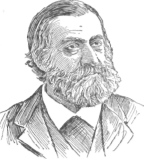LEGUME 1050
Description
This page of the book is from "The New Student's Reference Work: Volume 2" by Chandler B. Beach, Frank Morton McMurry and others.
LEGUME
1050
LEIDV
equality. Candidates in time of peace must have served in some military or civil capacity for 25 years; exploits on the field or severe wounds are a sufficient claim in time of war. The order gives free education to 400 of the daughters, sisters and nieces of its members.
Leg'ume, a pod consisting of a single carpel which splits down both sides, as in the bean, pea etc. See Fruit.
Le'high, a river rising in Luzerne County, Pa., and flowing through the eastern part of the state into the Delaware, with which it unites at Easton. Some of its scenery is very picturesque; but its valley is especially noted for mines of anthracite, for which the river affords an outlet, having been rendered navigable by extensive improvements for a distance of nearly 100 miles from its mouth.
Lehigh University. See South Bethlehem.
Leibniz (Up'ntts), Gottfried Wilhelm, German philosopher and scholar, was born at Leipsic on July 6, 1646. Even in infancy he showed wonderful capacity for acquiring knowledge. He seems to have largely been his own teacher, pursuing many studies in addition to those of the regular course. He taught himself to read Livy when only eight; and his father's library was thrown open with permission to read to his heart's content. At this his joy knew no bounds. Before he was 12 he had made himself familiar with the Latin classics, had begun the study of Greek, and wrote verses with such facility that his friends feared his love of poetry would keep him from the more serious pursuits of life. He next took to logic and philosophy, and soon made himself master of ancient and modern authors, besides developing theories and ideas of his own. In 1661 Leibniz entered the University at Leipsic and applied himself chiefly to mathematics and law; but the degree of doctor of law being refused on account of his youth he in 1666 graduated at Altdorf, the university town of Nuremberg. His thesis attracted so much attention that he was offered a professorship. This, however, he declined, having "very different things in view." In the following year he was introduced to the elector of Mainz by whom he was appointed to the office of councilor, and thus obtained leisure to pursue his studies in politics and philosophy. From 1Ŏ76 Leibniz was custodian of the public library of Hannover until his death on Nov. 14, 1716. In addition to law, science and philosophy, Leibniz gave much attention to theological questions, and sought earnestly to unite the Protestant and the Roman Catholic church. Failing in this, he afterwards sought to unite the Lutheran and the Reformed church of Prussia, but with a like want of success. See Guhrauer's Life.
Leicester (les'tÍr), a city in England, is situated on Soar River, 22 miles south of Nottingham. Tradition states that it was founded by King Lear, and occupies the site of Roman Ratś. Many Roman relics have been found, and the Jewry Wall is known to have been made of Roman brick. The old town hall, the new city buildings, free library, art school and five old churches are among the noticeable buildings. Leicester's rapid grown is due to its manufactures, of which the chief are hosiery, boots, shoes, webbing and lace. The city received its charter from King John. Popu-tion 232,111.
Leicester, Robert Dudley, Earl of, was born in 1532 of a very ambitious family. On the accession of Elizabeth, he became one of her favorites, and high honors and offices were conferred upon him. In 1550 Dudley married Amy Robsart and, the marriage proving an unhappy one, she removed in 15Ŏ0 to the house of Anthony Forster in Berkshire, where soon after she was found lying dead with a broken neck at the foot of a staircase. The circumstances were suspicious, and it was generally believed that she was murdered and that her husband was an accessory. But the queen continued to bestow gifts and honors upon Dudley, and in 1564 created him Earl of Leicester. Great attention was paid to him in England and in other countries. In 1575 Elizabeth visited him at Kenil-worth (g. v.). His public life was a failure; yet such was his hold upon the affection of Elizabeth that in 1588 he was appointed to command the forces at Tilbury to defend the country against the Spanish Armada. He died suddenly in September of the same year.
Leidy (lÓ'dÔ), Joseph, American naturalist and physician, was born at Philadelphia,
Pa., Sept. 9,1823. He graduated in the medical department of the University o f Pennsylvania in 1844, and ini853 was made professor of anatomy in that institution. I n 1871 he was made professor of natural h i s-tory at Swarth-more College, remaining there until 1884, when he was appointed director of the department of biology established that year in the University of Pennsylvania. This position he held until his death at Philadelphia, April 30, 1891. The results of his researches, which were of great importance and value, were recorded in his

JOSEPH LEIDY


